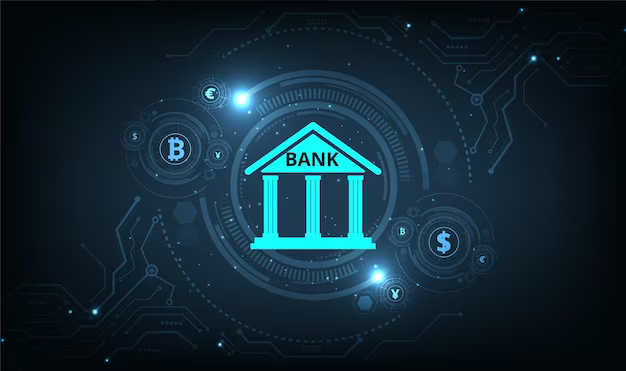
-
Apexlink
Real Estate
-
DLS
General Insurance
-
DMV
Government
-
Entiger
Fintech
-
GIS Mapping
Gas & Petroleum
-
HMS
Employee Benefit
-
HAWA
Government
-
Harley
Community
-
IHG
Hotel & Tourism
-
Sparkseeker
Humane Tech
-
Track Ninja
Sports
-
Response Vision
Disaster Management
- Artificial Intelligence
- Application Services
- Automation Services
- Cyber Security
- Chatbot Experts
- Data Analysis
- Data Warehouse Services
- Machine Learning
- Digital Commerce Services
- Digital Transformation
- Infrastructure Service
- IT Support
- IT Consulting
- IT Outsourcing
- IOS Development
- Android Development
-
Cross Platform Development
-
Gaming App Development
Artificial Intelligence (AI) is the white knight redefining industries by revolutionizing how the businesses operate. This new technology is already transforming a range of legacy businesses. Therefore, it comes as no surprise as AI in banking has also become the norm. Currently, AI is used by 80% of banks worldwide for fraud detection. It is not without reason.
AI banking allows these businesses to reduce the overall cost of operations, while offering better services to the customers. Additionally, the tools are highly effective at fraud detection and much more.
In this post we will explore the transformative impact of Artificial Intelligence Services on banking operations and steps you can take to leverage the technology.
Banking on Technology Capable of Making Change – Artificial Intelligence
The banking systems have always suffered from a relatively slow pace. This is primarily because financial decisions require deliberation. Mistakes not only get you legal action but also plummet the overall reputation of the organization.

Therefore, leveraging the artificial intelligence solutions once they reached a specific standard was only natural. Humans make mistakes, but AI does not. Additionally, blockchain technology, along with AI, is giving financial institutes the power to capture immutable data and lower the cost of operations while increasing their overall effectiveness.
For example, AI can increase the loan approval rates by up to 20% on the revenue front.
AI Applications in Banking
AI for banking is not limited. It is already impacting almost every aspect of organizations dealing with the systems. The various ways in which AI can assist banking systems are listed below:
A. Customer Service and Chatbots
AI technology for banks is truly revolutionizing the way customers interact with the systems. AI in the banking industry is being used to personalize banking experiences. These companies are already investing in AI to add that personal touch that customers need for improved results
1. Enhancing Customer Interactions
With artificial intelligence in the fintech and banking sector, the customers experience convenience that is otherwise almost impossible to offer. From easier uploads of documentation to removal of errors, everything is possible with AI. It can help check eligibility for loans and other offers, reducing the overall approval time and offering advanced services.

2. 24/7 Support and Accessibility
When it comes to AI in commercial banking consulting, the 24/7 support that technology can offer is unmatched. It allows the banking sector to provide the needed services without keeping the banks open throughout the day and night.
B. Fraud Detection and Security

Artificial intelligence in banking is truly transforming the security systems as we know them. From automated calls for suspicious transactions to special authentication measures, banks are doing much more than before to keep your money safe.
1. AI-powered Fraud Prevention
Users are now accustomed to making all their purchases and paying all their bills online. Now, they do not have to go to a bank to withdraw money or deposit checks because they have the option to do it online. However, the online movement makes cyber threats a real danger, capable of moving a lot more money than otherwise possible.
AI in the banking industry is helping them recognize fraudulent activities, track loopholes in the systems, and minimize the risk
2. Cybersecurity Applications
Additionally, banks are using AI to manage cyber threats. AI in banking app development can monitor the systems, allowing organizations to respond to such instances before they affect employees, customers, or internal systems.
C. Personalized Banking Experience
AI in retail banking and other systems is truly transforming the way customers experience their online interactions with organizations. It includes getting a personalized banking experience, where the machine knows everything, it needs to provide you with the best possible assistance.
1. Tailored Product Recommendations
To begin with, AI applications in banking allow for tailored product recommendations based on individual spending habits. It can become a game-changer in improving revenue for the organizations.
2. Customized Financial Advice
Additionally, it allows businesses to offer bespoke financial advice to users based on past data analysis. From better loaning services to improved savings, all of it is possible with the banking sector.
3. Chatbots
Now, the banks are also using AI-powered chatbot technology to always offer relevant support.
AI in Risk Management
A. Credit Scoring and Underwriting
AI in retail banking does more than just make the customer end experience more convenient. It also transforms the way business operates. For one, Banking AI can better calculate the overall credit score and offer loans to the right people. Additionally, it can help reduce the risk of default.
1. Improved accuracy in assessing creditworthiness
AI can calculate and accurately assign the right credit score to every individual, making it easier to offer loans.
2. Reducing the risk of defaults
The data can help businesses find the best possible candidates to loan out money. It can help reduce the number of people defaulting on their payments. For this, AI makes use of the behavior pattern data available to banks. Thorough analysis helps the systems make better decisions and avoid defaulters while providing people the right loaning options for maximum chances of return.

B. Market Trend Analysis
Artificial intelligence in software development is allowing banks to leverage the huge amount of data they have for the better. It helps analyze the market trends and sentiments, making suggestions for bank improvement based on the various matrices.
1. Predictive analytics for investment decisions
AI in the financial industry is helping businesses make better investment decisions. It uses predictive analysis to determine the best investment options for the future.
2. Real-time market monitoring
AI in banking and finance services can help track real-time market trends to find patterns that can help them provide better services. It can help improve user experience, detect fraud, and make credit decisions.
C. Regulatory Compliance
Banking is a regulated sector because it directly deals with money. Governments regulate their operations to ensure that banks don’t become the perpetrators of financial crimes or take huge risks in investments, leading to large-scale defaults.
Artificial intelligence and banking combined can tackle this by using technology to read new compliance requirements. While AI cannot replace the compliance department, it can definitely help make operations more efficient.

Banks must ensure that AI applications services prioritize consumer protection. This includes providing accurate information about the use of AI, obtaining informed consent, and protecting customers from potential harm resulting from AI-driven decisions.
Challenges and Considerations of Using AI in Banking
Using AI in banking comes with several challenges and considerations that need to be carefully addressed to ensure the successful and responsible implementation of these technologies.
Here are some key challenges and considerations:
A. Data Privacy and Security Concerns:
Data Breaches: As the use of AI includes processing large amounts of customer data, any breach will have severe consequences. It can include financial loss and damage to their reputation.
Data Governance: When mixing artificial intelligence and banking, proper data governance practices are essential. It is the only way to maintain the integrity and privacy of customer information.
B. Ethical Considerations in AI-driven Decision-Making:
Biases: AI algorithms may inherit biases present in the training data. It can lead to unfair or discriminatory outcomes. As fairness in decision-making is essential to avoid negative social impacts and potential legal consequences, the banking sector must take every step possible to avoid it.
Adding Transparency: The lack of transparency in AI models can become a concern. Banks need to ensure that their AI systems are explainable, enabling them to provide clear reasoning behind automated decisions to customers, regulators, and other stakeholders.
These challenges highlight the need for a comprehensive and well-thought-out strategy when implementing AI in banking. Collaboration between technologists, legal experts, and regulatory bodies is crucial to navigating the complex landscape of data privacy, ethics, and compliance.
Additionally, continuous monitoring and adaptation of AI systems are necessary to address emerging challenges and ensure ongoing alignment with regulatory requirements and ethical standards.
Embracing Artificial Intelligence in Financial Services
Despite the challenges, it is essential for banks to enter the AI-first race. The new generation is utilizing the online platform to make all their banking choices. So, any bank that leaves the opportunity behind is likely to suffer losses. The current expectations of 24/7 banking services make the use of AI not a choice but a necessity.

Become an AI-First Bank – The Steps to Follow:
Now that you know why it is necessary to use artificial intelligence in banking, you must know the steps to follow to achieve the goal. Here are the four broad steps to follow while paying required attention to people, governance, process, and technology for the best results:
1st Step: Leverage the expertise of AI consultants to develop an AI strategy.
2nd Step: Utilize AI technology consultaning services expertise to create a plan based on the various use cases of these extraordinary tools.
3rd Step: Now, hire AI development experts to develop and deploy the solutions for your organization.
4th Step: To keep up with the ever-evolving AI industry, take the time to operate and monitor the systems, making changes as needs arise.
AI in Banking – The Ultimate Tool for Banks Can Rely on!
The banking system needs a makeover, and AI is the tool capable of making the change. AI in banking can not only improve the overall customer experience but also transform operations, leading to better overall efficiency and output.
With the right AI consultants on the banks’ side, combined with innovative ideas, the banking system can truly experience a transformation like no other.

FAQ
A) How is AI used in Banking?
AI can help automate tasks, improve customer service fraud detection, assist with optimizing investment and predict market trends.
B) Which situation has been an enabler for the rise of artificial intelligence (AI) in recent years?
The rise of artificial intelligence (AI) in recent years is driven by advances in machine learning, increased computing power, and the abundance of big data. Cloud computing, open-source frameworks, and improved internet connectivity facilitate AI development.
Investment influx, interdisciplinary collaboration, AI's integration into industries, and the establishment of ethical guidelines further propel its growth, making AI a transformative force across various sectors.
The abundance of data in the financial sector meant little before, as humans could not utilize it to their full potential. With AI, banking systems are now capable of utilizing the data to their maximum potential.
C) How does credit AI work?
Credit scoring AI works by analyzing various data points to assess an individual's creditworthiness. This artificial intelligence solution typically considers factors such as payment history, outstanding debts, length of credit history, types of credit used, and new credit applications.
Machine learning algorithms, often trained on historical credit data, predict the likelihood of a borrower defaulting on a loan. This process enables lenders to make more informed decisions, streamline the credit approval process, and improve risk assessment accuracy.







 Artificial Intelligence
Artificial Intelligence
 Blockchain
Blockchain Cloud Computing
Cloud Computing Infrastructure
Services
Infrastructure
Services Metaverse
Metaverse QA
Automation
QA
Automation UI/UX
UI/UX








